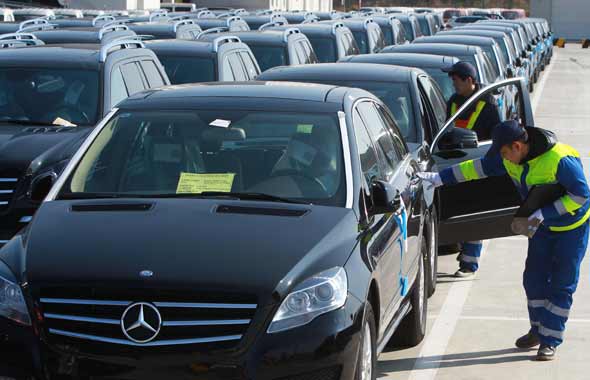 |
|
|
|
|||||||||||
|
 Entry-exit inspection and quarantine bureau officials inspect imported cars at Waigaoqiao port in Shanghai. China will expand its imports to help stimulate domestic consumption. [Photo/Xinhua] |
Detailed policy measures urged to boost nation's foreign trade
China should take concrete steps to expand imports and cut tariffs quickly, as the deceleration of import growth is raising economic concerns, Wei Jianguo, former deputy minister of commerce, said in an interview.
Compared with weak exports, "a continuous slowdown of import growth is what industry insiders are more concerned about", said Wei, who is also secretary-general of the China Center for International Economic Exchanges, a top government think-tank.
Last month, Premier Wen Jiabao told a State Council meeting that China is studying how to expand imports by buying more foreign commodities, energy, advanced technology and equipment, key components and consumer goods and cutting import tariffs.
"China should identify imports as a national strategy ... it should launch detailed measures and policies and put words into practice to boost imports as quickly as possible," Wei said. "Lowering import tariffs should be given priority."
As of Sunday, import tariffs on items including leather garments, accessories and computers were cut from 20 percent to 10 percent.
Over the weekend, the People's Bank of China, the central bank, announced a widening of the yuan's trading band against the dollar from 0.5 percent to 1 percent, effective from Monday.
The move is regarded as a way to boost imports, spur economic growth and make the exchange rate more market-oriented.
The year-on-year growth rates for imports and exports have been sliding since late last year. Data from the General Administration of Customs show that imports rose 5.3 percent last month, while exports increased 8.9 percent, yielding a trade surplus of $5.35 billion.
GDP grew 8.1 percent in the first quarter, the slowest pace in nearly three years.
The State Council said the economy faces many challenges, although it is generally in stable shape.
"For three decades, China has prioritized expanding its exports, but now, it needs to shift to imports," said Wei.
"Expanding imports could help China stimulate domestic consumption", part of the effort to transform its economic growth model by 2015, he said.
In March, imports of commodities including copper, oil and iron ore fell. Imports of refined copper, copper alloy and products totaled 462,182 metric tons, down 4.6 percent from February.
Copper imports will probably decline "a decent amount" this month, Standard Chartered PLC said in a report.
Imports are also a leading indicator for exports, said Wei.
Exporters are being challenged by weak demand for Chinese products in developed regions, particularly Europe, and rising labor and raw material costs.
During a visit to Fujian province and Guangxi Zhuang autonomous region this month, Wen pledged to take measures, including export tax rebates, to ensure "steady growth" in trade this year. China aims to expand foreign trade by 10 percent this year.
The World Bank said recently that China's GDP growth may slide to a 13-year low of 8.2 percent in 2012. It cited sluggish export demand and decelerating domestic investment and consumption growth.
Wei told China Daily in March that China is likely to cut imports tariffs on many consumer goods at least twice this year.
Though many import tariffs have been cut since the start of global financial crisis, more categories of goods should be included and the cuts should be larger, said Wei.
dingqingfen@chinadaily.com.cn